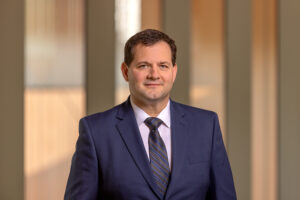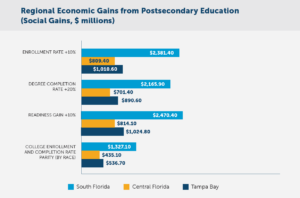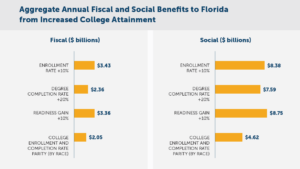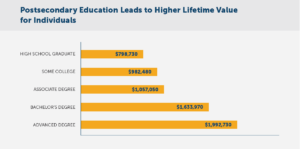To boost student numbers, study suggests Florida should go beyond merit-based funding.
By Dayana Melendez
Original Air Date: December 20, 2024
Host: As the value of college education is increasingly questioned, a new report reveals how growing post-secondary education rates could grow the Florida economy by billions of dollars. The study by Helios Education Foundation — a non-profit with offices in Arizona and Florida — also shows how expanding college access could transform individual lives and communities throughout the state. Dayana Melendez spoke with Dr. Paul Perrault, a Senior Vice President at Helios.
Dayana Melendez: A new economic analysis from the report called “Florida Future Billions” shows that increased college enrollment could significantly grow the state’s economy. According to the study, raising college enrollment by just 10% would add $8.38 billion to Florida’s economy annually. These figures represent not just monetary gains but transformative opportunities for communities statewide.

Dr. Perrault
Dr. Perrault explained how the economic benefits extend far beyond individual earning potential:
Dr. Perrault: Factors really driving that, especially by having more post-secondary education opportunities for students, is number one, those with a post-secondary degree typically have higher wages, meaning that they have more consumer spending. Typically, those that have a post-secondary degree have better healthcare, which means that they have better access to food and better health outcomes.
DM: The projected economic impact varies by region,. The Miami-Fort Lauderdale-West Palm Beach metropolitan area could add over $2.4 billion to its local economy annually, while the Tampa-St. Petersburg-Clearwater area could gain nearly $1 billion in economic growth. Despite these promising projections, significant obstacles remain.
The report identifies several persistent barriers that prevent Floridians from pursuing higher education. Dr. Perrault highlighted one particularly concerning trend:
 PP: One barrier is that there’s just this narrative out there that college isn’t worth it anymore. And that’s part of the reason why we did this analysis and did this work. There is a push and pull that college is too expensive. Look at all the money that people have in loan debt. And so that is a barrier that really actually is impacting people deciding whether they should go to college or not.
PP: One barrier is that there’s just this narrative out there that college isn’t worth it anymore. And that’s part of the reason why we did this analysis and did this work. There is a push and pull that college is too expensive. Look at all the money that people have in loan debt. And so that is a barrier that really actually is impacting people deciding whether they should go to college or not.
DM: The timing of this initiative carries special significance. I asked Dr. Perrault why Helios chose this moment to launch their campaign:
PP: COVID really disrupted the educational system across the country. And when we start  looking, there’s been a lot of other opportunities, especially around social justice and other issues the last four or five years in particular. When we look at post-secondary completion in Florida, not all groups, when we look at by race or identity or by financial background, are doing as well. And so how do we give everybody that opportunity? Helios really is an organization that wants everybody to have an opportunity for success and to go to college regardless of zip code or where you are.
looking, there’s been a lot of other opportunities, especially around social justice and other issues the last four or five years in particular. When we look at post-secondary completion in Florida, not all groups, when we look at by race or identity or by financial background, are doing as well. And so how do we give everybody that opportunity? Helios really is an organization that wants everybody to have an opportunity for success and to go to college regardless of zip code or where you are.
DM: The report presents concrete policy recommendations to address these disparities. A key proposal calls for expanding financial support beyond traditional merit-based programs.  According to Dr. Perrault, this shift could help eliminate long-standing barriers to college access:
According to Dr. Perrault, this shift could help eliminate long-standing barriers to college access:
PP: Florida has done a fantastic job on things that are more merit-based, like Florida Bright Futures. Now let’s see that same kind of dedication for students that might not — let’s take that focus away from just merit to also focusing on students that are from low-income backgrounds. Poverty is really the biggest indicator of ultimately many times if a student’s going to go to college or not.
DM: While the economic projections are compelling, the potential human impact of these changes reaches even further. The Florida College Access Network plans to launch a campaign to promote greater access to higher education, putting these recommendations into action. Dr. Perrault emphasized that the initiative’s success depends on sustained community engagement:
PP: We don’t want this to be something that is a nice news blip, and then it goes away. If Florida is really to be successful, it really does need to improve opportunities for students to go to college. If families want to be more successful, post-secondary education opens the doors for so many things.
DM: This has been Dayana Melendez with WSLR News.
WSLR News aims to keep the local community informed with our 1/2 hour local news show, quarterly newspaper and social media feeds. The local news broadcast airs on Wednesdays and Fridays at 6pm.